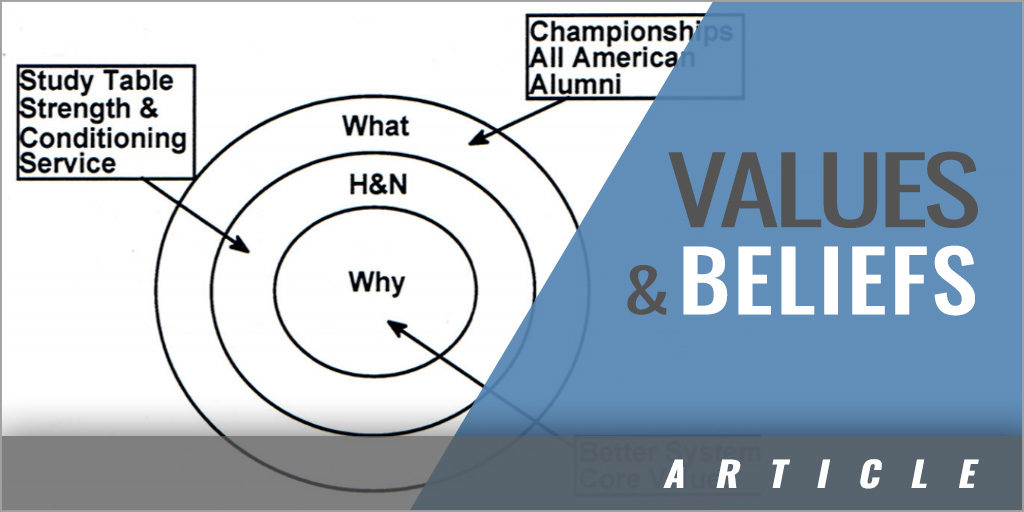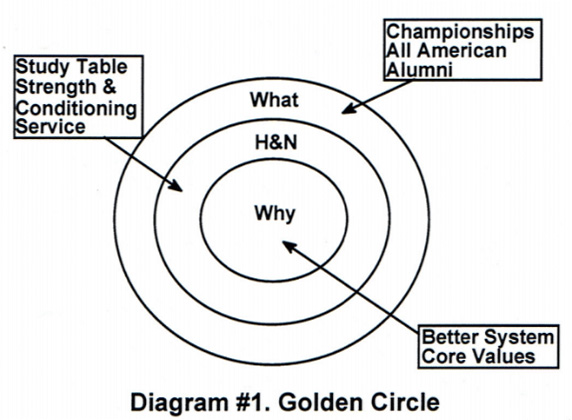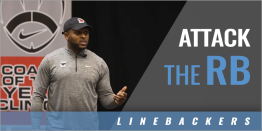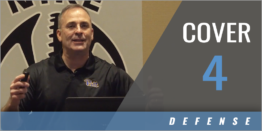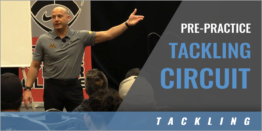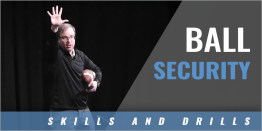|
By: Ian Shoemaker - Central Washington University Originally Published in: 2018 Nike Coach of the Year Clinic Manual - by Earl Browning Provided by: Nike Coach of the Year Thank you for hanging in fellows. I know it is getting late in the clinic and I appreciate you coming. What I try to do with my talk is to make it valuable on both sides. I am going to talk a little about program development that we did when we took over this program. Some of this stuff will apply to you and some will have to be adapted to the high school level. I am going to talk about some things we did four years ago, when I took over the program at Central Washington. I think we did things that developed the culture of this program. What did we do? How did we get it done? What was the plan? This was my first head job. The administration was wondering if I could do anything to improve the situation. The first thing I put up was "prove that we can help." That is where I start with the philosophy. CWU Coaching Philosophy:
Once you do those things you gain the respect of the team. I must prove to the players and staff that what I provided will make them better. I can help the individual in the class room and can help the team with their improvement and raise them up. If you do the things on your list then the team will give you respect. Just because you have the title as head coach, it does not mean you automatically get the respect of the team. When I played in high school, I was a D-3 type of player from a small high school. I have to find a way that what I was talking about will make them better. I am not going to get that respect until I present that opportunity.
I like having my two kids around our program. I like them coming to morning run and weight training. I like them coming to practice. I want the players to see how I deal with my wife and children. I want to be the same guy at home as I am on the football field. I do not care who is having a bad day or a good day, it is my job to be the same guy every day. That helps you build stability for the players. A lot of the players we deal with are not from homes with a lot of stability. I am sure you are dealing with the same things. They do not have the family and support at home that they might need. When they see me, they know what they are seeing. They know I am going to be the same guy every day. Do not be something different. You must be yourself every day and be your best self. I think that will provide their trust. I gain their respect and now I am going to gain their trust. They believe I am going to treat them the same as the other players on the team. He is going to be the same guy there in the office every day. He is going to do this thing for me and I am going to trust him. Prove You Care:
The next big thing we have to do is prove that we care. You can care about their performance and their academics, but they see through that. We have to care about them more than as a coach and player. I have to get outside of that and go beyond the coach/player relationship. Care for them as a mentor in life. They know what it takes to be a father. What it is going to be like when he is a husband. Care for them as if they were family members. Invite them to the house. Have them around my kids and wife. If we prove that we care more than just a football player and a student. When you do those things then you will gain the loyalty of the team. You want guys in your program that love the game and are going to come back and contribute to the betterment of the team and the University. They want to be a part of the program because it changed their lives. They still believe that 20 years down the road. We are trying to provide great alumnus at the University. Alumnus that are reaching back and giving back to our kids. I just hired a new safeties coach. We handed him the philosophy. We told him that this was his way into the program so that he can gain their respect, trust, and loyalty. We give him the coach's philosophy, and this is how your players are going to act. OUR WILDCAT BROTHERHOOD Family vs. Brotherhood I think when we talk about these things, I think that family gets thrown around a little bit too loosely. The big thing today is how you take care of women in our lives today. This is the same thing. How are you going to break down on family in a huddle with a bunch of men? When I go out recruiting and have a home visit, I explain to them that the people in that household are your family. The players on a football team becomes your brotherhood. That is as close as we can come with a bunch of guys. I think the family is sacred and its use should be limited. Brotherhood is a better descriptor of a football team. How do we define brotherhood? Brotherhood: The bounding men from various backgrounds, beliefs, places and eras around a singular set of life-directing commitment. On a football team there are all kinds of ethnic backgrounds. We recruited a quarterback out of Hawaii this year. It does not matter what ethnic group he comes from. All our recruits are making the same decision for the same reason. They want to play for Central Washington. In a high school you may not have that. If we can look at what made the Wildcats great over a period of time, it was a bunch of life-directing commitments. That explains how we operate in the classroom, at the study table, and practice. But after you leave the program it controls how you operate in life. We bring in alumni every Friday, during our walk through. We try to bring the alumni in before we go out to practice. We put the team in the stands and the alumni comes out on the field that he once played on. He talks to the players about what it meant to him to play there and what it was like to be a Wildcat. The alumni can take whatever slant he wants to take. All I want is for our guys to understand the lure of giving back to the program. What I want is for our guys to graduate and want to come back and talk to the team at some point because they loved the experience of playing here. The question we ask all the time is Can you contribute to the Wildcat brotherhood?" At the end of the process that is a question, they all have to answer. The player is evaluating the coaching staff, but we are also evaluating the recruit. That is the question you should ask your players. If they want to be a part of this high school football team, then they have to buy into some of the things we are preaching. They can contribute. It may not be as an all-state or conference football player, but as a role player. Developing a Belief System: That gets you into the concept of the "Golden Circle." (Diagram #1). The outer ring of the circle is the "what" of the circle. It stands for what are we putting out in our program. We are putting out championships, All-Americans, and alumni. In the four years we played for Central Washington, what have we produced? The next inner circle is "how." The how in the program is the study tables, strength and conditioning, service, and things like that. The middle of the circle is why? To get your players to buy into what you are doing, they need to know why. What we are doing and how we are doing it is an everyday thing. That is called a process.
You need a solid foundation of your why. As a program, as a head coach, or assistant coach, what is your belief system? Why are we doing what we are doing? We are not doing this just to win a championship, get more athletic, or get stronger. This is the point I tried to develop in my interview for this job. The belief system is how we started the entire thing. Wildcat Belief System:
This is the blue print and this slide has been running for four years. It was put up before the committee when I got this job. It has been before every recruit that has ever visited here. This is our "why." These are the things we are going to try to build our program around. After they understand the why, we will show you the how and the production it produced. The first thing I told the committee was that we could win a national championship at Central Washington. We proved that this year at some levels. We ended up 11-1 and were the number one team in the region. We went into the second round of the playoffs and had built a 28-7 first half lead over Texas A & M Commerce. We lost the game in a double overtime. They went on to win the national championship. After you lick your wounds and the pain goes away, we can be satisfied in that we are doing it the right way. We have the right people and right schematics. In the second half of that game we did not do enough offensively to win that game. The loss is on me and I take the blame for that. Our structure and recruiting are sound. The second thing is we believe we can win those championships with elite Northwestern athletes. I do not want to discourage out-of-state athletes. We are a five-year development program. We want our athletes to red-shirt and play the five years here. We are the only Division ll program in the state of Washington. There are a lot of population in our area. We have Seattle, Tacoma, Vancouver, and a lot of populist areas. We are sitting well as far as recruiting. We believe we can build this program with the student-athlete model. That means the student is important and comes first. It is a priority for our players. I can say that I am going back after this clinic and look at the grades and we will be alright. That we will have a 3.2 GPA for the entire team. That is not going to happen. We have moved the academics from a 2.4 to a 2.9, which is a good advancement. Our goal is to be a 3.0 program. That is the product of what we have done. Here is how we do it. We have an academic support system. Academic Support System:
We found a way to make it an incentive on the scholarship end. This is something I made up when I became the head coach. I wanted to prove to the boosters, administration, and parents that academics meant something to me. There are two things I control as a head coach. I control playing time and scholarships. I control other things but those are the two things I can have an effect on right away. It is listed as the Book Bonus Scholarship. The top 20 athletes get a $500 bonus added to their scholarship. If the player is not on scholarship, he gets a scholarship. Every program has a player that is always going to perform high with his academics. It is easy for them to get those types of awards. For those not so gifted academically, we have an improvement category. We give the 10 guys that make the biggest leap in their GPA over the course of the year is in that award category. I did not get this done in my first year but I kept after it and have accomplished that. We have support staff and academic advisors to help with the selection of courses. One thing we did this year was to put a GPS tracker on the athlete's phone. If they are struggling with their academics, we knew whether they were in class or not. This makes it clear to the players that academics are important and they must be responsible for their grades. Athletic Support System: Strength and conditioning:
Workout Structure:
In our strength and conditioning periods during the off-season we lift three days a week and condition two times a week. In season, the traveling team lift two times a week. The redshirts lift four times a week. The structure of the program is kind of unique. When we start our program everyone starts in a plain white cotton T-shirt. We have all the Nike gear, but everyone starts in a white plain cotton T-shirt. That presents a clean slate mentality. We are not 11-1. That was the group that just finished the season. This is a new group and they have something to prove. They have to start at square one. We lost 12 seniors that were a major part of this team. This is a new team. To get a colored shirt, you have to earn it. We have lifting shirts for accomplishment. We call them the iron Wildcat. But you have to earn them. You have to earn the Wildcat logo. The message we want to send to the team that everyone starts the season clean. Earning the t-shirt is not just for things down in the weight room. We roll all their behavior into the t-shirt program. We include study table, class attendance, and service projects. We roll all that together to earning that t-shirt. In the winter we organize 10 man teams. These teams are made up of an assortment of players. We do not have a position group. We have linemen, backs, linebackers, quarterbacks and receivers in the group. They are all classes and scholarship levels. We try to put a player who we think will be a leader of next year's team as the team group leader. The group leader is responsible for checking his group's attendance. We want them as locker mates in the locker room. This builds team unity. Friday morning is the accountability day. This is for players that have an issue with something in the program. Class attendance, study table misses, and so forth. We bring them in at 5:00am. We do a campus tour. We run them through the campus. They come back to the lockers and do some cleaning in the training room, equipment room, or locker room. If the players misses study table, he comes in on Friday and does the work individually. If it happens again his winter group comes in with him and does the work. The next step is the position and the final straw is the unit. By that time that player will probably be on the bricks. This is working the peer pressure on the delinquent player. At the end of the winter workouts, you can tell the players that are not working. They are the ones in the white t-shirts. Everybody knows what he did. We believe we must invest in our players and in the community. We are going to invest into our players, character and leadership. We have to invest into our community and give back and play it forward. This is one of the why's in our belief system. We are going to make an investment in our players who in turn will make an investment into the community, which will make for a better situation all the way around. Leadership and Character Training:
Must attend 4 of 5 leadership meetings to have your name placed on the ballot in the fall. We schedule 5 leadership breakfasts. I will bring in a guest speaker to address them at the meeting. I can get professors from campus. Other coaches from the area. ROTC personnel and alumni who are willing to come in and talk on leadership. We do it at 7:00am prior to school so not one will miss a class. This is a volunteer meeting and they do not have to come. Most of them decide that it can be helpful in their leadership skills. If they do not come or do not attend 4 of 5 meetings, they will not be on the ballot for captain in the fall. We had an all-American tackle who was a junior this year. He was big and did a great job. The ballots went out in the fall and he was not on it. He got really upset and came to see the coaches about the situation. He wanted to know what was going on. I told him he only made 3 of the 5 leadership meetings. I told him that was his choice. I told him that was a "you" not an "us" issue. That was a hard decision for me to make because he should have been a captain. The point was that it was not important enough for him to get out of bed and attend the meetings. The rules are for everyone not just a few. We text him the night before, talked to him and he still did not meet the criteria. I told him I was protecting the entire team and could not make an exception. Being captain is not a popularity contest for me. If the player is not willing to put the effort in to make your leadership better, then I am not going to put you in a position to be a leader on the team. One of the things that was in place before I became head coach was the #44 Tradition. It started in 2008 the #44 jersey has been handed down according to some rigorous standards. I liked it so we kept it as one of our traditions. The player who shows the standard of the tradition wears the number 44 throughout the season. It is a great honor. The guy on defense is the "guy" in your program. The cool thing about the tradition is that the guy who wore the jersey gets to present it to the next player to wear it. It is the passing of the tradition. All of the players that wore the jersey were All-Americans or Players of the Year in the conference for Central Washington. Kevin Haynes was two-time player of the year in the conference, he was a three-time captain for us and wore the number #44 for the last three years. Service is a big award for our team. We award the players that gives back to the community more than anyone else. Community Service
When I came in as head coach, Central Washington had a reputation about it academics which was not very appealing. I was going to change all that by the type of recruits I was going to sign. My first home visit was to Drew Wallen. He was the first verbal commitment I got. In high school he had a 3.9 GPA, he was president of everything he belonged to. He was an all-conference player, a super star, and a great kid and leader. We were improving ourselves internally with what we were doing and the changes we made within our program. We were improving ourselves externally with the recruits we were bringing in. That was the first thing I did. I went on the road for two weeks with the intention of changing the atmosphere of this program. In our first recruiting class, we signed three AP (advanced program) presidents. That was important and part of the evaluation. We wanted to sign leaders from high schools coming into our program. Drew came in as a true freshman and competed against 550 athletes for this award. As a true freshman he won the leadership award. Everyone within our department said there is a kid that is going to do well in anything he does. He is highly religious and has plans to go into the ministry. He just got offered a Graduate Assistant's job coaching basketball. He has never played college basketball. I know one thing, if you put him into that job you will never have to worry about leadership, work ethics, and determination. Community Service:
We invite elementary schools in our area to come in and participate in the football clinics. We provide t-shirts, ice cream, pizza, and other things. We get donors to underwrite all the expenses for the t-shirts and it is all free to the kids. Our players have a good time working with the young kids. We also work on selling the people in the community. We are trying to keep the cost off the kids. We can get people to help defray the cost by donating ice cream, pizza or money for the t-shirts. Generally it takes very few calls to get people to help you out. We also collect canned food at the entrance for the food drive. We have a food drive and donate the processes to the local food bank. It does not take much effort to get the word out. We have an elementary recess program. I have two little ones. I have a five and seven-year old. We work with the elementary school with a watchdog program. That puts a male role model into schools. The schools told me they did not have enough staff to administrate lunch. We only have a couple of teachers that can do the lunch duty. They have kids running all over the place. I have 100 players work force that can help with the supervision of a school cafeteria among other things. We sign the players up and 4-6 players go to the two elementary's in our neighborhood. They go to the school and recreate with the kids. They shoot basketball or throw the football around. They are basically supervising the playground. We get involved with the Yakima River cleanup projects. They go out into the recreation area on the Yakima River and help clean up the trash and debris that accumulates. We have players that coach youth league teams in the area. These are gifts to needy families provided by a position group. The names are put on a Christmas tree. The position group leader picks the name off the tree and they fill the order. It could be Christmas toys or money, but it is all needed. They do not take them to the family. They get the gifts wrapped and return them to the place they got the names. One of the last ones that we do has to do with bone marrow. The program is called "Be the match." It is about getting people to sign up for bone marrow registry. If you look at the figures, you will understand how important this is. More than 1/3 of African-American men who have a blood born cancer, can be cured with a bone marrow transplant. In the registry there is one in three matches. There are not enough people who have registered as donors. We are trying to get people to sign up for this type of things. We are offering free tickets to those that become part of the program. The athletic department is involved with this program also. We believe in recruiting players that share our beliefs. How did we develop our core values? One of the first things we did was to put the 10 man winter teams together. We created a competition. Team Ownership:
We took the 10 man teams and sent them on a scavenger race. In modern terms and amazing race. They had to go to different places and received clues along the way for doing mindless things. They may have to do jumping jacks to get the clue. The last clue they got were core values. The coached cherry-picked the word and put 10 different words into the envelopes. Each team at the end got the opportunity to define the word from the envelope. The teams have to define the term and explain what it means to the team right now. We took the terms and definitions and present them to the team. They voted on the term and definition they thought most resonated with being a Wildcat. Core Values:
These are our core values and how we define them. This is exactly the way they wrote it down. Loyalty: Unwavering trust and a 100 percent buy into every aspect of the program; sustaining trust even through stressful situations; continued on and off the field throughout you time at CWU. Relentless: A mindset of an individual or group ferociously attack a goal or opponent, consistently withstanding adversity, persevering tenaciously and without complacency. Selfless: Ones belief in the greater good of the team. Not caring about personal goals but their will to get the team to achieve a collective goal. The realization that the team's needs are more important than your own. The willingness to do what needs to be done for the greater good. Devotion to others welfare or interest and not one's own. Give till it hurts. Integrity: Knowing we can account for ourselves, our teammates, and our coaches, and trust that all will do their job on and off the field. Taking pride in what we do while being honest to the brotherhood. Grit: Unfaltering mental toughness and resilience when faced with adversity. We display unyielding physical and mental dominance. Before the start of the season we had to face eight road practices. The forest fires clouded the valley with smoke. We had to travel two and half hours across the mountains to get a two-hour practice in. Then we had two and half hours back. We did it eight times during fall camp. I knew we were going to be good when I did not hear a complaint from the kids. Our kids did not flinch. That had to do with that selfless attitude. It was what is was, and we made the best of it. We did not know from day-to-day what was going to happen. That is when we knew this group was different. So many times it is not the most talented or athletic team that wins the game. It is the team that can outlast the opponent. That could be in the classroom as on the athletic field. We must have the ability to give up short-term goals for those long-term ones. For our guys, it was about being mentally and physically tough and resilient. You must have grit to dominant someone. That is our five core values and how we developed them. When we are recruiting we ask the players "Do you believe in what we believe?" If you do not this may not be the program for you. You must have buy in from the players you are going to play. You can do one of two things. Choose wisely or get them to get excited about what you believe. Ninety-five percent of your players will buy into what you are selling. The problem is the five percent that do not. You spend all your time trying to get them to follow the group and be a productive part of the team. You pursue those guys until it is not valuable any more. There comes a time when you have to cut bait on them and focus on the guys that are doing things right. I am going to focus and celebrate the players that are doing it right instead of chasing those guys that do not want to buy in. If it is the same guys causing all the problems, you have to go on and develop the ones who are now. When we came in that first year we cut five starters. We ended up 5-5. I redshirted ever recruit and did not burn one of them. The second year I cut four starters. We went 5-5, 7-3 and 13-1. I appreciate it guys. I know this was a long clinic, but I hope you got something out of it. |
